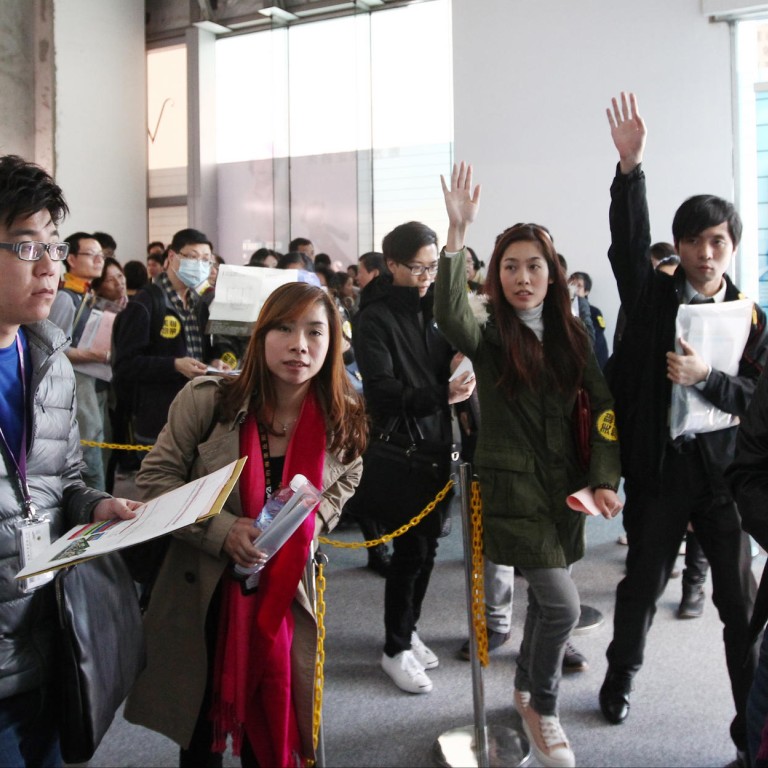
Homes sweet homes for rich who beat duty slug
Buy a few flats at same time, lump them into a single deal and you can skip double stamp duty
Does the government have one set of standards for rich homebuyers and another set for the not-so-rich? That appears to be the case - for seemingly inexplicable reasons.
Despite the doubled stamp duty on properties of more than HK$2 million - unless it is the first home for the buyer - those buying several flats at the same time only face having to pay the old stamp duty rate if their purchases are lumped together under one sales and purchase agreement.
A investigation has found that the proposed amendment puts Hongkongers buying a second flat at a disadvantage because they would need to pay much more in stamp duty than rich investors without property who buy five or more flats in one go.
Land Registry data shows Sharon Lam Suet-yee bought five flats at yoo Residence in Causeway for HK$91.57 million on October 8. On October 24, Tse Sum-ping forked out HK$119.92 million for five flats at the Cullinan atop the Kowloon MTR Station.
Such multiple purchases by individuals are far from isolated cases. Last week, at Sino Land's joint-venture luxury residential project Avenue, in Wan Chai, 10 individual buyers each bought two flats on the same day.
A quirk in the Stamp Duty Ordinance means they could avoid having to pay double stamp duty, imposed to combat speculation.
When the asked the government if buyers of multiple flat were liable to pay double stamp duty, it said: "For the acquisition of several residential properties by the execution of one agreement, it is regarded as one single transaction for the purposes of stamp duty. The instrument, i.e. the agreement for sale, will be charged at the applicable rate on the total consideration of the residential properties so acquired."
The Financial Services and Treasury Bureau said if the buyer was a permanent resident who did not own any flats, "this agreement [for sale] will be charged at the old rate".
The government declined to respond directly to a specific question about whether its latest anti-speculation measure - to be backdated to February 23 on passage of the amendment - could be exploited by people buying multiple flats.
Critics say rich buyers are making a mockery of the double stamp duty.
Lilian Chiang, a senior partner at law firm Deacons, said certain features of the housing market would make it difficult to achieve the amendment's intention of quelling speculation and cooling an overheated market.
Chiang said that to avoid paying double stamp duty, investors were transferring properties they owned to family members.
Financial Secretary John Tsang Chun-wah announced the doubling of stamp duty for all properties costing more than HK$2 million after seeing home prices surge by 65 per cent since 2008, but specifically exempted first-time home buyers who were permanent residents.
Chiang said the treatment of buyers of multiple flats undermined the intent of the new measure, which was designed to give priority to permanent residents wishing to own a home.
Hong Kong Institute of Surveyors spokesman Lawrence Poon Wing-cheung described it as "a major loophole being exploited by shrewd investors".
Poon said the retrospective nature of the proposed duty increase made it hard to plug the loophole unless another bill was drafted to deny the buyer of multiple flats exemption from extra duties. "But it will further delay the implementation of the proposed duty," he said.
The government and lawmakers have failed to reach agreement on their preferred amendments, with no immediate end to the impasse in sight.
The Stamp Duty (Amendment) Bill 2013 was tabled in May and is still being examined by a Legislative Council bills committee.
Liberal Party chairman James Tien Pei-chun said his party planned to reject the proposed tax measure because "this bill has many loopholes".
Lawyers have been holding the extra stamp duty since February 23 on the expectation that the bill will be passed.
Chiang said the proposed law was unfair because people not engaged in speculation would be hit by the extra stamp duty. She cited the case of a woman who wanted to transfer her share in a flat to her grandson. The extra duty would be payable because the grandson, as a co-owner of the flat, already owned a property. "The new measure should not penalise such arrangement where there is no speculative element," she said.
In the case of the five-flat deal at the Cullinan for HK$119.92 million, the buyer could escape the 8.5 per cent duty payable if the buyer did not own a home when signing the deal. As a single transaction, the stamp duty would be at the old rate of 4.25 per cent - the maximum for properties exceeding HK$21.73 million - or HK$5.09 million.
If the government were to revise the bill, with only the first flat charged at the old rate and the rest at the new rate even if they were bought in a single transaction, the Cullinan buyer would face a stamp duty bill of more than HK$10 million.

